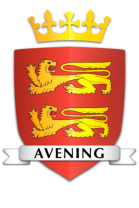

© Avening Parish Council 2023
“Preserve, Conserve, Enhance”
26 George Hill
Private: 2nd Battalion, Seaforth Highlanders Extract: Stroud News and Journal Friday 31st May 1918 Page 2 "The heroes of Avening have been very hard put in the war. One of the most sad cases is that of Pte. George Hill of the Seaforth Highlanders and second son of the late Mr. James Hill of Avening. He was badly wounded in the German offensive about the end of April in a gallant defence of the British positions. His bravery elicited the following high commendation. "The Major commanding the 4th Division has received a report of the gallant conduct of Pte. G Hill, 2nd Battalion, Seaforth Highlanders, and he wishes to congratulate him on his fine behaviour." Pte. Hill was severely wounded in the attacks and on the British retirement he was found lying upon the battlefield by the Germans. They, however, gave him aid by attending to his wounds, but left him just where he fell. When the British counterattacked they found him. But he had been there for three days and his strength was so far gone that he died in a short time. He was 33 years of age. At one time he worked at Oakham Mill, Nailsworth. Then he went to Bristol and afterwards to London. He leaves a widow and one child at Cricklewood.” Extract: Stroud News and Journal Friday 14th June 1918 Page 3 " Pte. G Hill, formerly of Avening whose death in France from wounds was reported a fortnight ago, has been awarded the DCM, (Distinguished Conduct Medal) as a posthumous honour in recognition of his gallant conduct in holding up the German advance in April. His wife, who lives at Cricklewood, has been informed of this award. He was in the Seaforth Highlanders, 4th Division and was very highly commended by the officer in command." George's family history has some inconsistencies. Always given the name George, even by the Commonwealth War Graves Commission, his full name was George Hubbard Hill. We know his father was James Hill, a quarryman, born about 1858 in Bath and his mother Elizabeth, born in Wootton-under-Edge around 1852. The family settled in Star Lane in about 1877. George's birth is registered in 1884. We have no record of a baptism for him or his siblings but they may have been with the Baptist church. The family had moved to Mays Lane by the 1891 census. Elizabeth had died by this time. She was not buried in Holy Cross churchyard. James had remarried by the 1901 census and the family including George were still living in Mays Lane, when he was described as a mattress maker. He worked at Oakham Mill, Nailsworth. As confirmed by the press reports, he married Ethel Slinger in London in the spring of 1911 and they had a daughter two years later. We are unsure when he enlisted in the Seaforth Highlanders although he may well have been conscripted and posted to whatever unit most needed men. He found himself facing the German Army at the time of the enemy’s last big push, which started in March 1918. He was one of two men manning a Lewis gun, he firing the weapon and his comrade being the ammunition carrier and loader. As the Germans advanced, George lost contact with his colleague and other members of his section but continued the fight on. He was wounded and lay in the field being tended to by the advancing enemy troops. Whilst lying there, the British counter-attacked and three days later he was found and taken back to a field dressing station. It was too late to save him and he died on 3rd May 1918. The Commonwealth War Graves Commission Certificate confirms the Distinguished Conduct Medal (DCM) and the citation reads: “For conspicuous gallantry and devotion to duty. As Lewis gunner he fought his gun in an exposed position. He poured drum after drum into the enemy, who overwhelmed his team. After lying wounded, he escaped from the enemy in the dark.” This is not quite consistent with press reports in Stroud which explained that he had lain on the battlefield until the British counter-attack. The local newspapers also gave his medal award as the Military Medal (MM). The Seaforth Highlanders’ archives can find no record of the MM being awarded but confirmed a DCM to GH Hill of Cricklewood. Confusion continued in Avening when it came to the War Memorial tablets in our church. His entry can be seen as George M M Hill, although, as an excuse, he has been away from the village for ten years. He carried Avening’s highest award in the village for WW1. He is buried in the Étaples Military Cemetery. He was awarded the Victory Medal and the British Medal which his wife would have received. We have been unable to locate any relatives.
AveningArchive
WW1 Heroes





© Avening Parish Council 2023
AveningArchive
26 George Hill
Private: 2nd Battalion, Seaforth Highlanders Extract: Stroud News and Journal Friday 31st May 1918 Page 2 "The heroes of Avening have been very hard put in the war. One of the most sad cases is that of Pte. George Hill of the Seaforth Highlanders and second son of the late Mr. James Hill of Avening. He was badly wounded in the German offensive about the end of April in a gallant defence of the British positions. His bravery elicited the following high commendation. "The Major commanding the 4th Division has received a report of the gallant conduct of Pte. G Hill, 2nd Battalion, Seaforth Highlanders, and he wishes to congratulate him on his fine behaviour." Pte. Hill was severely wounded in the attacks and on the British retirement he was found lying upon the battlefield by the Germans. They, however, gave him aid by attending to his wounds, but left him just where he fell. When the British counterattacked they found him. But he had been there for three days and his strength was so far gone that he died in a short time. He was 33 years of age. At one time he worked at Oakham Mill, Nailsworth. Then he went to Bristol and afterwards to London. He leaves a widow and one child at Cricklewood.” Extract: Stroud News and Journal Friday 14th June 1918 Page 3 " Pte. G Hill, formerly of Avening whose death in France from wounds was reported a fortnight ago, has been awarded the DCM, (Distinguished Conduct Medal) as a posthumous honour in recognition of his gallant conduct in holding up the German advance in April. His wife, who lives at Cricklewood, has been informed of this award. He was in the Seaforth Highlanders, 4th Division and was very highly commended by the officer in command." George's family history has some inconsistencies. Always given the name George, even by the Commonwealth War Graves Commission, his full name was George Hubbard Hill. We know his father was James Hill, a quarryman, born about 1858 in Bath and his mother Elizabeth, born in Wootton-under- Edge around 1852. The family settled in Star Lane in about 1877. George's birth is registered in 1884. We have no record of a baptism for him or his siblings but they may have been with the Baptist church. The family had moved to Mays Lane by the 1891 census. Elizabeth had died by this time. She was not buried in Holy Cross churchyard. James had remarried by the 1901 census and the family including George were still living in Mays Lane, when he was described as a mattress maker. He worked at Oakham Mill, Nailsworth. As confirmed by the press reports, he married Ethel Slinger in London in the spring of 1911 and they had a daughter two years later. We are unsure when he enlisted in the Seaforth Highlanders although he may well have been conscripted and posted to whatever unit most needed men. He found himself facing the German Army at the time of the enemy’s last big push, which started in March 1918. He was one of two men manning a Lewis gun, he firing the weapon and his comrade being the ammunition carrier and loader. As the Germans advanced, George lost contact with his colleague and other members of his section but continued the fight on. He was wounded and lay in the field being tended to by the advancing enemy troops. Whilst lying there, the British counter-attacked and three days later he was found and taken back to a field dressing station. It was too late to save him and he died on 3rd May 1918. The Commonwealth War Graves Commission Certificate confirms the Distinguished Conduct Medal (DCM) and the citation reads: “For conspicuous gallantry and devotion to duty. As Lewis gunner he fought his gun in an exposed position. He poured drum after drum into the enemy, who overwhelmed his team. After lying wounded, he escaped from the enemy in the dark.” This is not quite consistent with press reports in Stroud which explained that he had lain on the battlefield until the British counter-attack. The local newspapers also gave his medal award as the Military Medal (MM). The Seaforth Highlanders’ archives can find no record of the MM being awarded but confirmed a DCM to GH Hill of Cricklewood. Confusion continued in Avening when it came to the War Memorial tablets in our church. His entry can be seen as George M M Hill, although, as an excuse, he has been away from the village for ten years. He carried Avening’s highest award in the village for WW1. He is buried in the Étaples Military Cemetery. He was awarded the Victory Medal and the British Medal which his wife would have received. We have been unable to locate any relatives.WW1 Heroes



























